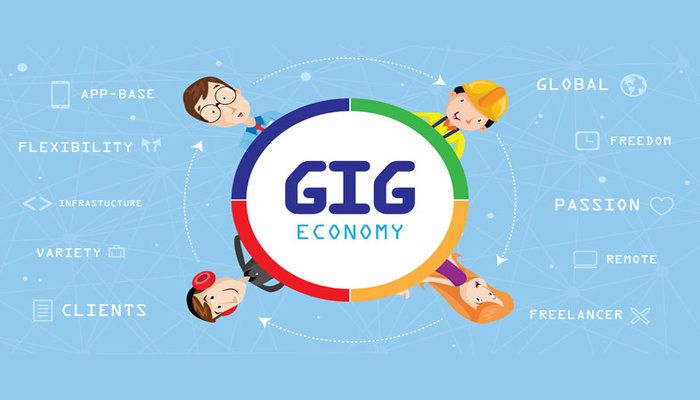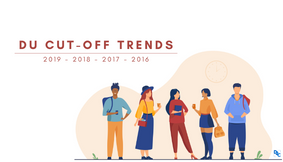The gig economy is the answer to all your questions!

The Covid-19 pandemic is one such conundrum that has given birth to multiple challenges. The obvious mortality concerns, impact on the economy, education, social fabric, mental health is just the tip of the iceberg. The government is trying its best to flatten the curve by minimizing the cases and the corporates are trying to secure the lives of its workforce. With individuals being asked to remain at home to protect themselves, every sector has shifted from a physical place of work to a virtual platform. The pandemic has created a disruption in the world with every company focussing on innovation and it is expected that there will be an increased dependence on the 'Gig Economy'. Gig economy basically refers to hiring or taking the help of freelancers or contractual workers for completion of projects rather than full-time employees. Covid-19 is expected to transform the way 'gig economy works'.
The perception of the Gig economy is changing. With the lockdown came the imminent fallout of reduced spends on goods and services that help drive the economy. Even big giants had to either let go of a chunk of their workforce or had to enforce pay cuts. The irony of the situation is that talent is needed to get out of this pit and full-time talent is what organisations cannot afford at the moment.
A deeper understanding of the workings of a gig economy will help you ascertain the skills you need to hone and where you can find opportunities to stay afloat during these turbulent times.
The birth of the gig economy
The term was coined in 2009 by New Yorker editor Tina Brown. It referred to all the freelancers and contractual workers. For any customer who wishes to get a project done that consists of standardized, repeated processes, it sure was easier to take to the help of freelancers, rather than hiring full-time employees, who will do the project at minimum cost. But this was expected to cause certain delays as well because the customer might have to ensure proper coordination among all the freelancers in order to ensure completion of the project. The entire communication being done virtually was not considered desirable and as a result, the gig economy could not become the big thing that it was expected to.
The current business world has been strong-armed into refining and making the remote workspace model work.
The second birth of the gig economy
Keeping the current scenario in mind, where due to the pandemic the entire workforce of companies is asked to work from their homes using a virtual platform to coordinate among themselves, we can see that the gig economy-esque culture is back in. In addition to this, the objective of a company during these times is to minimize their cost on every project. This led to the unfortunate use of the pink slip. Having let go of a sizeable chunk of their workforce meant that the work still had to be done but in a much smarter manner. And this is where the gig economy was reborn!
As the business world is staggering towards resuming normalcy, or at least some for it, measures need to put in place to heal. This healing has to be combined with a plan to grow if we are looking at switching to the fifth gear. This is where the gig economy will come to the rescue. With money exchanging hands for just the task/project as opposed to a resources time that he gives to the organisation by working a full day.
And they lived happily ever after!
It is important for us to now understand what the future has in store for this economy. Any project of a company is usually divided into tasks. The tasks that are structured and specified can be outsourced to freelancers and contractual workers. The unstructured tasks will be the responsibility of full-time employees as they need to be constantly modified.
Secondly, all the projects wherein the time duration between the completion of the task and presentation to the client or the stakeholder is long the work can be done by the freelancers. Finally, the most important element will be understanding if the work can be done remotely. If the answer is yes, the companies will prefer freelancers over full-time employees.
The gig economy and you
The pandemic will end when it will. Clear timelines isn't a luxury we have right now. Nobody in this planet is going to walk away from this unscathed. But it isn't as bad a situation as it is being touted to be. Things will change and if you, the future workforce adapt and change with it, you would have successfully fit into the "new normal".
The pandemic is therefore bound to increase the dependence on the gig economy. Since there is an element of cost-saving, it will be preferred by the companies. But the question is, can an outsider, who isn't personally vested in the growth of the organisation act as an "functional part" of the organisation? We have to wait for the pandemic to end to get an answer to that.
Here is what you need to do to acclimatise yourself to the tomorrow:
- Make sure that your skills will work for you in the new normal
- Supplement your full-time degree (the course work for which still hasn't been updated to the current times), with newer concepts and methodologies
- Network! Network! Network! Peer-to-peer learning carries a might that cannot be stressed upon enough. To compensate for its absence network with peers and leaders on LinkedIn
- Have a clear goal in mind
- Have a clearer plan B!
Login to continue reading
And access exclusive content, personalized recommendations, and career-boosting opportunities.














Comments
Add comment